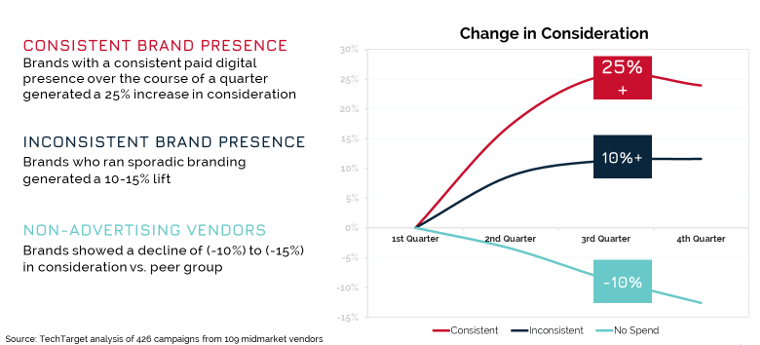There’s a lot that goes into driving success for brands. When determining overall business and marketing goals, the biggest objective our B2B clients list is driving actions, like landing page form submissions or scheduling a demo. However, executing campaigns that are designed to drive conversions doesn’t always make sense if your audience isn’t educated about your brand. They won’t be able to quickly recall your company, services or products, and therefore will need more time and education to convert. Brand awareness campaigns are specifically designed to fill this gap, and you’ll find bottom-of-the-funnel campaigns are more successful if you start with brand awareness.
Consider this: 95% of buyers are not ready to buy products or services at any given time (B2B Trends, LinkedIn B2B Institute). That means only 5% of your potential customers are ready to buy your product or enlist your services. That’s a pretty small group, especially when you consider the other companies you’re up against. When you launch a lead generation campaign that includes those 95% of buyers outside of your market, you’re not only competing with other brands, your brand awareness is also lagging. This audience probably isn’t aware of who you are, what you do and how you can help them. They might not even need your products or services at the time you run your lead generation campaign. In this case, you may be spending your ad budget inefficiently while failing to maximize the effectiveness of a full-funnel marketing approach. This is where brand awareness comes in, and why it’s a crucial step to ensure success down the line.
This graph illustrates exactly why brand awareness is impactful to a brand’s bottom line – brands with a consistent presence online have a 25% increase in consideration among their prospects (TechTarget analysis of 426 campaigns from 109 midmarket vendors). This puts them in a better position when they run lead generation campaigns, since they will be able to convert their prospects and send them to their sales team with more knowledge of the brand. Those that don’t have a consistent brand presence or aren’t advertising at all have less consideration among their prospects and therefore have a harder time driving conversions.

While lack of awareness presents a challenge to your brand, it also presents the perfect opportunity for you to develop a top-of-funnel strategy. This will allow you to educate your prospects and fuel each stage of the pipeline with the type of buyers that are most likely to convert when they enter that final stage.
There are several tactics for increasing your brand awareness. You can start with social and search ads that educate your prospects and introduce them to your products, services and – most importantly – your brand. You can then use email to further educate them on the value they’ll gain from your products or services. Most importantly, your brand can begin to stand out in the marketplace, building vital mental availability. Mental availability is the likelihood your brand will be thought of or noticed when your prospect is ready to buy. It’s the main reason why prospects can quickly recall a brand when shopping around for a solution to their problem.
For B2B businesses to thrive long-term, mental availability is crucial, and the best way to create it is through brand awareness campaigns. There are several tactics to consider when looking to increase mental availability among your prospects:
- Identify goals and gaps in your marketing plan — like increasing brand awareness or improving brand perception — to create a holistic and effective strategy.
- Create a customer-centric marketing strategy (as opposed to brand-centric) to show your audience you understand their needs and wants.
- Run brand awareness-focused campaigns earlier, longer and to a broader audience to give it time to educate the 95% of buyers that are out of market. B2B brands are less likely to use broadly targeted media than B2C brands, but expanding their reach can increase purchase intent and brand awareness.
- Use emotional creative that will resonate with your audience; this is how B2B brands can stand out in a crowded market. Consider moving away from more rational creative, like Dell did in their campaign The Unseen Ballet.
These tactics are proven to help increase brand awareness by building strong mental availability that can drive significant results even for B2B brands. When executed, businesses are able to fuel their pipeline with educated prospects who know the brand. Brand awareness is key to driving growth for B2B brands over the long term, and will make it easier to drive leads through the funnel and convert when the time is right.
Once you complete your audit, you’ll have a holistic understanding of your position in the market, how Looking for help elevating your B2B brand awareness in the marketplace? Reach out and one of our experts will be in touch!
